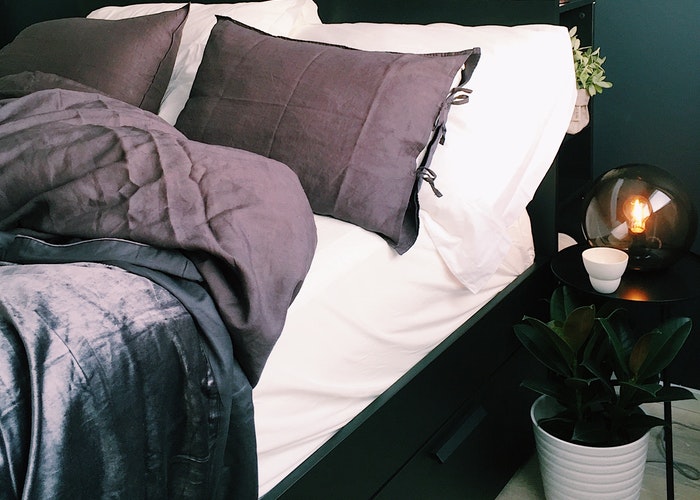5 Ways To Get More Rest When Your Sleep Schedule Is Messed Up

While I used to sleep a sound seven to eight hours a night — how lucky I realize I was now — lately I’ve been waking up in the middle of the night or far too early in the morning. It turns out I’m not alone. Many of us are experiencing sleeping difficulties during this time, The Harvard Gazette reports. It might not seem like that big of a deal to lose an hour or two here and there, but over time, it can have a significant impact:
“In addition to the cognitive consequences — from inability to focus to general irritability — chronic insomnia is correlated with a spectrum of serious health problems, including diabetes, cardiovascular disease, and hypertension….Mental health problems are complicated by a lack of sleep. Insomnia lasting two to four weeks increases the risk of depression…while lack of sleep is also linked to a poorer response to treatment.”
Here are five tips I’m using to get better rest. Reach out to your doctor with your specific concerns, especially if your sleeping issues do not resolve over time.
Set a firm wake-up time.
It has taken me literally years to accept the studies that show a regular wakeup time is key to consistent sleep, even on the weekends. In fact, sleep scientist Dr. Jason C. Ong has noted that “if you want to sleep well on a regular basis, the single most important thing you can do is to have a consistent wake-up time.” Prior to quarantine, I only woke up at the same time on weekdays, leaving weekends as a free-for-all. However, now that my sleeping has been poor, to say the least, I’ve noticed just how much my late wakeups on Saturday and Sunday impact the rest of my week.
Some mornings I wake up exhausted, having had broken sleep the night before. While it’s toughest on those days to get up at my usual 7 AM, it makes a huge difference in improving the following night’s sleep.
Get a sound machine.
Sound machines produce low volume sounds to provide background noise as you rest. Whether you find ocean waves, cafe chatter, white noise, or traffic ambiance peaceful, you are sure to find a sound for you. Best of all, you can get these nifty lifesavers for about $20.
At first, I wasn’t sure if I would like a sound machine when falling asleep, but if nothing else, I’ve found that the sound machine drowns out the little noises around my house that might usually occupy my thoughts. Plus, it’s a great tool for keeping conversations private or maintaining focus while working from home.
Avoid long naps.
While I love a good power nap, I’ve found that longer, afternoon slumbers are not so helpful. According to a study in the Journal of American College Health, college students who frequently napped for several hours or napped late in the day appeared to be at a higher risk of poor nighttime sleep.
If you find yourself needing to rest during the day, try taking a quick 20-minute power nap. Granted, such naps generally work best for those who can fall asleep quickly, but if you’re able to do so, these naps can give you a boost when you need it most. I power nap best around lunchtime but experiment with what works for you.
Put away your screens before bed.
Putting my phone away before bed has been a tough habit to kick. In all honesty, I’m probably addicted to the feeling of having a friend’s call or my latest email just a touch away. But letting my phone charge at its nightstand before I sleep offers me huge peace of mind and much better rest. In fact, blue light has been shown to disrupt our circadian rhythm, making sleeping more difficult.
Create a bedtime routine.
A consistent routine can help signal to your body that it is time to rest. Whether your routine includes a nighttime shower, chamomile tea, or a good book, try implementing a small routine into your life at the same time before bed. Lately, I’ve been free-writing for 10 minutes each day before bed as a way to get out my thoughts and reflect on the day. It helps prevent my mind from racing to think about the things that I could have done differently once I’m actually ready to sleep.
With all of that said, know that it’s understandable to experience sleep challenges during periods of high stress, let alone a pandemic. Some nights these tips work great for me, and sometimes I still can’t fall asleep until 2:00 AM, regardless. For me, what matters most is applying consistency and reminding myself that I am trying my best.
Simplicity Bryan is deeply entrenched in the worlds of self-help, gratitude, personal finance, and organization. She’s happiest paddleboarding with her pup and storytelling with a purpose. You can follow her here.
Image via Pexels
Like this story? Follow The Financial Diet on Facebook, Instagram, and Twitter for daily tips and inspiration, and sign up for our email newsletter here.




